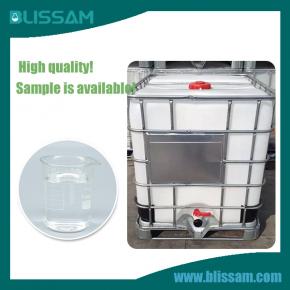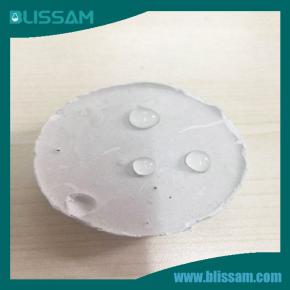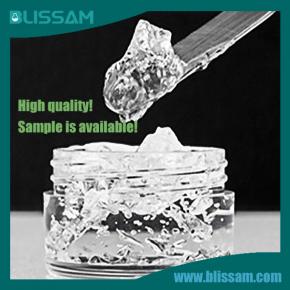As one of the leadingepoxy resin silicone oil manufacturers in China, Blissam specializes in the development of advanced materials. The company has been providing high-quality products and reliable services to customers around the world since its establishment. We specialize in the development and production of various types of silicones to meet the needs of a wide range of industries including coatings, adhesives and electronics.
Silicone resin is a semi inorganic and semi organic polymer, with a main chain composed of - Si O - and side chains containing organic groups. Due to its multiple active groups, it can undergo further crosslinking reactions, ultimately forming an insoluble and non fusible three-dimensional structure curing product. This product has many excellent properties, such as resistance to high and low temperatures, weather aging, hydrophobicity and moisture resistance, high insulation strength, low dielectric loss, arc resistance, radiation resistance, etc.
about epoxy resin silicone, we have carefully prepared some relevant professional knowledge documents for you, {hope to provide some help to you who are interested in epoxy resin silicone oil


1epoxy resin silicone products exhibit excellent chemical resistance, making them very popular in a variety of industrial environments. They can withstand exposure to acids, solvents and other harsh chemicals without degrading, making them a reliable choice for use in environments where chemical exposure is a concern.
2epoxy resin silicone products have become increasingly popular due to their exceptional durability and longevity. These products are created using a unique silicone compound that has excellent resistance to weathering, UV radiation, extreme temperatures, and chemical exposure. As a result, they can withstand harsh environments and maintain their performance and aesthetic qualities for extended periods.

Silicone resin is a versatile and durable material that has become increasingly popular in a wide range of industries. It is a synthetic polymer that is made from silicon, oxygen, carbon, and hydrogen. Its unique chemical properties make it resistant to high temperatures, UV rays, and chemicals, making it an ideal choice for a variety of applications.One of the key features of silicone resin is its durability. It has a strong and flexible molecular structure, making it resistant to wear and tear. This makes it a popular choice for products that require frequent use or exposure to harsh environments.In addition to its durability, silicone resin is also highly versatile. It can be easily molded into various shapes and forms, making it suitable for a wide range of applications. It is commonly used in the production of sealants, adhesives, and coatings for construction and automotive industries.

where the potential of silicone resin is being harnessed in new and exciting ways. With its unique properties such as high thermal resistance, superb adhesion, and excellent weathering resistance, silicone resin has become a favored material for high-performance coatings. From industrial products to consumer goods, our cutting-edge silicone resin coatings provide superior protection and durability, making them an essential choice for a wide range of applications. Join us as we unleash the untapped potential of silicone resin and revolutionize the world of coatings.
Silicone Resin--An Ultimate FAQ Guide.
1.How to Produce Silicone Resin?
2.Can Silicone Resin be used as a sealant?
3.Can Silicone Resin be used as coating?
4.How is Silicone Resin stored and handled?
5.Is Silicone Resin affected by humid environments?
6.About Silicone Resin payment method
7.Is Silicone Resin fire-resistant?
8.What happens when Silicone Resin comes in contact with air?
9.What is the difference Silicone Resin Fluids Blissam vs Silicone Resin Dow Corning vs Silicone Resin Wacker Chemie AG
10.About Silicone Resin production management system
11.Is Silicone Resin harmful to the human body?
12.Is Silicone Resin a natural material?
13.Can Silicone Resin be used to make gap fillers?
14.Does Silicone Resin have any impact on the environment?
15.Can Silicone Resin be used in indoor or outdoor products?
16.About Silicone Resin quality system
17.Does Silicone Resin have high temperature resistance?
18.Is Silicone Resin available in multiple colors?
19.What happens to Silicone Resin when exposed to light?
20.What application areas can Silicone Resin be used in?
21.What are the main ingredients of Silicone Resin?
1.How to Produce Silicone Resin?
Usually, various mixtures of methyltrichlorosilane, dimethyldichlorosilane, phenyltrichlorosilane, diphenyldichlorosilane, or methylphenyldichlorosilane are used to decompose at lower temperatures in the presence of organic solvents such as toluene, to obtain acidic hydrolysates. The initial product of hydrolysis is a mixture of cyclic, linear, and cross-linked polymers, typically containing a considerable amount of hydroxyl groups. The hydrolysate is washed with water to remove the acid, and the neutral initial condensate is thermally oxidized in air or further condensed in the presence of a catalyst, ultimately forming a highly cross-linked three-dimensional network structure.
2.Can Silicone Resin be used as a sealant?
Yes.In the construction industry, silicone resin is often used as a building sealant. Due to its excellent weather resistance and adhesion, it can effectively prevent water and air infiltration, ensuring the sealing and durability of buildings. Organic silicone resin sealant is widely used in exterior walls, windows, and doors of buildings.
3.Can Silicone Resin be used as coating?
Yes, Organic silicone resin is mainly used in high-temperature coatings, wear-resistant coatings, anti stick coatings, and waterproof coatings.
4.How is Silicone Resin stored and handled?
Silicone resin should be stored in a dry and cool environment to avoid exposure to high temperatures. Generally speaking, the most suitable storage temperature range is 15-25 degrees Celsius. 2. Humidity requirements: Pure silicone resin is very sensitive to humidity, so exposure to high humidity environments should be avoided. The optimal humidity range is 40-60%. To maintain stable humidity, desiccants or humidity control equipment can be used. 3. Lighting requirements: Pure silicone resin should avoid prolonged exposure to direct sunlight, as ultraviolet rays can have adverse effects on its performance. Therefore, pure silicone resin should be stored in a dark place or covered with shading materials. 4. Packaging requirements: Pure silicone resin should be kept in a sealed state during storage to prevent the entry of air, moisture, and other pollutants. Common packaging methods include sealed bags, sealed cans, or sealed barrels. 5. Fire protection requirements: Pure silicone resin is a flammable material, so it should be avoided from coming into contact with fire sources and stored away from them. In addition, attention should be paid to preventing contact with other combustible substances to prevent the occurrence of fire accidents.
5.Is Silicone Resin affected by humid environments?
In the construction industry, silicone resin is often used as a building sealant. Due to its excellent weather resistance and adhesion, it can effectively prevent water and air infiltration, ensuring the sealing and durability of buildings. Organic silicone resin sealant is widely used in exterior walls, windows, and doors of buildings.

6.About Silicone Resin payment method
Silicone resin is a synthetic material widely used in various industries, such as construction, automotive, and electronics, due to its excellent thermal and chemical resistance. When it comes to purchasing silicone resin, there are several payment methods available, including credit card, bank transfer, and PayPal. These payment options provide customers with a convenient and secure way to purchase silicone resin. Furthermore, many suppliers also offer the option of cash on delivery, allowing customers to pay for their order upon receipt. With the increasing popularity of silicone resin and the various payment methods available, customers can easily obtain this versatile material for their specific needs.
7.Is Silicone Resin fire-resistant?
Yes,Organic silicone resin has significant advantages in resistance to open flame, firstly, it has good high-temperature resistance. Due to the presence of silicon oxygen bonds, organic silicone resin can maintain stability and combustion resistance in high-temperature environments, without producing toxic gases, making it an ideal refractory material.
8.What happens when Silicone Resin comes in contact with air?
Silicone resin is a thermosetting plastic, and one of its most prominent properties is its excellent thermal oxidation stability.
9.What is the difference Silicone Resin Fluids Blissam vs Silicone Resin Dow Corning vs Silicone Resin Wacker Chemie AG
Our company has over 10 years of experience in the organic silicon industry, and we have collaborated with many research institutions to carry out many innovative projects. Our product quality meets international standards, and quality inspections are conducted before each batch of products is shipped. In addition, we pay more attention to product development in specific fields and can customize personalized products for customers to better meet their needs.
10.About Silicone Resin production management system
1. Establish reasonable production processes and operating procedures: Production processes and operating procedures should undergo scientific research and verification to ensure the stability and controllability of the production process. The operating procedures should specify the requirements for the selection and maintenance of production equipment, the requirements for raw material batching and mixing, and the control requirements for processing conditions. 2. Strict control of production environment: The production environment of chemical products has a significant impact on product quality, so it is necessary to strictly control the production environment, such as temperature, humidity, pressure, cleanliness, etc. 3. Ensure the quality of raw materials: The quality of raw materials is the foundation of the quality of chemical products, so it is necessary to ensure that the quality of raw materials meets the requirements. The procurement, storage, transportation and other aspects of raw materials need to be strictly controlled. 4. Strengthen quality control in the production process: In the chemical production process, strict quality control is required, including quality inspection of raw materials, quality monitoring of the production process, and inspection of finished products. 5. Keep the equipment in good condition: The equipment used in the chemical production process needs to be regularly maintained and inspected to ensure its good condition and normal operation. 6. Training employees: In the chemical production process, employees are required to operate and control, so it is necessary to train employees to improve their skills and abilities to ensure that they can operate and control according to requirements. 7. Adopting advanced testing equipment and technology: By using advanced testing equipment and technology, the quality of chemical products can be more accurately detected, and problems can be identified and solved in a timely manner.

11.Is Silicone Resin harmful to the human body?
Organic silicone resin is a type of resin formed by copolymerization of silicone based monomers and organic monomers, commonly used as coatings, sealants, waterproofing agents, cleaning agents, disinfectants, cosmetics, industrial products, etc. Generally speaking, silicone resins are safe, but there are also some silicone resins that are toxic or carcinogenic. Specifically, the toxicity of organic silicone resin mainly depends on the silicon based monomers and organic monomers involved. If the silicon based monomers are low toxic substances such as ammonium disilicate and sodium disilicate, the toxicity of organic silicone resin is relatively low. But if the silicone monomer is toxic substances such as lead disilicate, the toxicity of organic silicone resin is higher. In addition, organic monomers in organic silicone resins may also have toxicity, such as benzene silicone oil, polyoxyethylene, etc. The current research results on the carcinogenicity of silicone resins are not uniform. Some studies have shown that organic silicone resins have carcinogenic potential, which may lead to liver tumors and lung cancer. However, some studies have shown that silicone resins do not have carcinogenic activity.
12.Is Silicone Resin a natural material?
Silicone resin is a synthetic material, meaning it is man-made and not found in nature. It is made from a combination of silicon, oxygen, carbon, and hydrogen, and is highly versatile and durable. Due to its unique properties, silicone resin is commonly used in a variety of industries, such as automotive, construction, and medical. While not a natural material, silicone resin has many useful applications and is preferred for its strength, heat resistance, and chemical stability.
13.Can Silicone Resin be used to make gap fillers?
The high elasticity and wear resistance of organic silicone resin make it a good filling material. Its application areas include: - filling of cables and cables - protective gaskets for electronic components - sealing strips for aircraft and cars
14.Does Silicone Resin have any impact on the environment?
Organic silicone resin is a green and environmentally friendly building material that does not cause any harm to the environment and human body.
15.Can Silicone Resin be used in indoor or outdoor products?
Yes,Silicone resin is widely used in industries, construction, electronics, medical, and daily necessities due to its strong heat resistance, weather resistance, chemical corrosion resistance, and electrical insulation properties.

16.About Silicone Resin quality system
Ensuring product quality is a key issue in the production process of chemical products. We will take the following measures: 1. Establish reasonable production processes and operating procedures: Production processes and operating procedures should undergo scientific research and verification to ensure the stability and controllability of the production process. The operating procedures should specify the requirements for the selection and maintenance of production equipment, the requirements for raw material batching and mixing, and the control requirements for processing conditions. 2. Strict control of production environment: The production environment of chemical products has a significant impact on product quality, so it is necessary to strictly control the production environment, including parameters such as temperature, humidity, pressure, impurities, etc. 3. Establish an effective quality management system: Enterprises should establish a comprehensive quality management system, clarify product quality standards, testing methods, quality control processes, etc., and comprehensively monitor the production process to promptly identify and solve problems. 4. Strengthen raw material quality control: The quality of raw materials in chemical products directly affects product performance and stability, so strict quality control of raw materials is necessary, including supplier selection, raw material inspection, storage and use, and other links. 5. Pay attention to employee training and quality awareness education: Employees are an important factor in the production process. Enterprises should pay attention to employee training and quality awareness education, improve employees' professional skills and quality awareness, and ensure stability and product quality in the production process. 6. Reasonable use of additives and additives: In the production process of chemical products, the reasonable use of additives and additives can improve product performance and stabilize product quality, but attention should be paid to the dosage and ratio to avoid adverse effects on the product. 7. Establish a product quality inspection and feedback mechanism: Enterprises should establish a product quality inspection and feedback mechanism to conduct spot checks or full inspections on the produced products to ensure that they meet quality standards. At the same time, timely handling and improvement should be carried out on the quality issues that have been feedback. In short, ensuring the quality of chemical products requires starting from multiple aspects, including production processes, environmental control, raw material quality, employee training, additive use, quality testing, and feedback mechanisms. Only by comprehensively considering and taking corresponding measures can the quality and stability of chemical products be ensured.
17.Does Silicone Resin have high temperature resistance?
Generally, the heat resistance temperature of synthetic resin paint is below 150 ℃, while organic silicon paint can be used for a long time at 200 ℃. If high-temperature pigments are added, the heat resistance can reach 400 ℃~500 ℃, and special ones can also reach 800 ℃~900 ℃. Therefore, it is suitable for coating high-temperature resistant components.
18.Is Silicone Resin available in multiple colors?
The color of organic silicone resin is mainly achieved by adding dyes to achieve different colors, divided into two colors: fully transparent and partially transparent. An opaque color is divided into three colors: milky white, gray black, and dark gray, suitable for different natural environments. No matter which color of adhesive is used, it can be very earthquake resistant, waterproof, corrosion-resistant, and resistant to high and low temperature tests, making it less prone to problems.
19.What happens to Silicone Resin when exposed to light?
Light cured silicone resin is a type of organic silicon material that can be solidified into a solid through light irradiation. It is usually composed of organic silicon monomers and photoinitiator. When light shines on the surface of the resin, the initiator undergoes a photochemical reaction, triggering a crosslinking reaction of the silicone monomer, thereby solidifying the resin into a hard solid.
20.What application areas can Silicone Resin be used in?
Organic silicone resin is mainly used as insulation paint (including varnish, enamel, color paint, impregnation paint, etc.) to impregnate H-grade motor and transformer coils, as well as to impregnate glass cloth, glass cloth wire, and asbestos cloth to make motor sleeves, electrical insulation windings, etc. Large area mica sheet insulation material can be prepared by bonding mica with organic silicon insulation paint, which can be used as the main insulation of high-voltage motors. In addition, silicone resin can also be used as heat-resistant and weather resistant anti-corrosion coatings, metal protective coatings, waterproof and moisture-proof coatings for construction projects, release agents, adhesives, and secondary processing into organosilicon plastics. It is used in electronics, electrical, and national defense industries as semiconductor packaging materials, and electronic and electrical silicone resins can be roughly divided into organosilicon insulation coatings, organosilicon coatings, and There are several major categories such as silicone plastics and silicone adhesives. Silicone resin processing additives have unique flexibility and compatibility, and have become a key component in the production of pulp and household paper. The details are as follows: (1) Electrical insulation paint: The volume, quality, and service life of motor appliances are closely related to the performance of electrical insulation materials. Therefore, various types of electrical insulation paints are required in industry, including coil impregnation paint, glass cloth impregnation paint, mica bonded insulation paint, and silicon paint for electronic and electrical protection. (2) Coating: Silicone resin has excellent properties such as heat resistance, cold resistance, weather resistance, and hydrophobicity. In addition, it can obtain colorless, transparent, and has good adhesion and wear resistance coatings, as well as anti adhesion and anti detachment coatings and moisture-proof and hydrophobic coatings. (3) Adhesive: There are two types of polysiloxanes used as adhesives: silicone type and silicone resin type, with differences in structure and crosslinking density between the two. Among them, there are resin based adhesives, including pure silicone resin and modified resin. (4) Plastics: mainly used in heat resistant, insulating, organic silicon plastics, arc resistant packaging plastics for semiconductor module shells, and foamed plastics. (5) Micro powder and trapezoidal polymer: Compared with inorganic fillers, silicone resin micro powder has the characteristics of low relative density, heat resistance, weather resistance, lubricity, and hydrophobicity. The trapezoidal silicone resin has higher heat resistance, electrical insulation, and flame resistance than the general mesh three-dimensional structure silicone resin.

21.What are the main ingredients of Silicone Resin?
Organic silicone resin is a highly cross-linked network structure of polyorganosiloxanes, usually composed of various mixtures of methyltrichlorosilane, dimethyldichlorosilane, phenyltrichlorosilane, diphenyldichlorosilane, or methylphenyldichlorosilane. In the presence of organic solvents such as toluene, it is decomposed with water at lower temperatures to obtain acidic hydrolysates. The initial product of hydrolysis is a mixture of cyclic, linear, and cross-linked polymers, typically containing a considerable amount of hydroxyl groups. The hydrolysate is washed with water to remove the acid, and the neutral initial condensate is thermally oxidized in air or further condensed in the presence of a catalyst, ultimately forming a highly cross-linked three-dimensional network structure.
Tag:alkoxy silicone resin,high temperature silicone resin,silicone based resin,silicone modified epoxy resin,silicone modified acrylic resin
Contact:
Phone: +86-15957191858
E-mail: info@blissam.com
Whatsapp:+8615957191858
Add: A647, No. 9, Xiyuan Road, Xihu District, Hangzhou, Zhejiang, China
We chat
